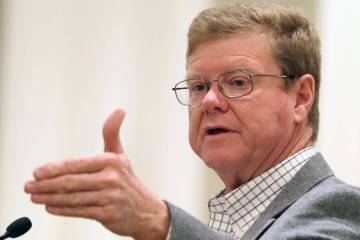Nevada readies federal funds to fight opioid addiction
Nevada governments are planning to expand opioid treatment and addiction prevention services as they begin to receive the first allocations of money from settlements the state made with drug manufacturers.
In January, Attorney General Aaron Ford announced that the state agreed to receive $285.2 million from opioid manufacturers and distributors for their role in exacerbating the addiction crisis in the state. That money is slowly being distributed to cities and counties beginning now, with a requirement that those funds be spent on addiction treatment and support services.
“This is huge,” said Kevin Schiller, Clark County deputy county manager for social services. “This will have a very significant impact across the county and state, since so many people come to Clark County for help.”
Opioid overdose deaths have been a constant in Nevada. In 2005, the state had the third worst rate of opioid deaths in the country at 18.7 deaths per 100,000 people, according to the Centers for Disease Control. In 2020, the state’s rate of 26 deaths per capita ranked 27th in the nation. Although Nevada’s per capita deaths from opioid deaths continues to rise, the state’s national ranking actually fell because even more people are dying in other harder-hit states, especially in the Midwest.
Compared to neighboring states, Nevada has the second worst rate of opioid deaths, behind only Arizona in 2020, the most recent year CDC data is available.
Funding from settlements with pharmaceutical giant Johnson & Johnson and three of the nation’s largest opioid distributors as well as some federal grant money are distributed based on the One Nevada Agreement. That plan divides money between the state, counties and some cities based on need.
Clark County will get approximately 37 percent of all of the state’s money due to its large population. Another 7 percent will go to the city of Las Vegas. In total, Clark County and its municipalities account for 46 percent of the settlement’s funds. The state takes 44 percent.
County spending plans
The county is taking a three-prong approach to spending its share of settlement funds, Schiller said. Officials are expanding current treatment services, creating new prevention programs and using funds to shore up needs for transitional housing.
Housing is a key part of the county’s plan, Schiller said, because many of the struggles organizations have with treating addiction start there.
“In the treatment world, you can’t talk about opioids in a vacuum,” Schiller said. “There is such a nexus to social service, you can’t talk opioids without talking about housing.”
Many addicted people are homeless or lack steady housing, he said, and by providing transitional and temporary housing to people in treatment, that treatment can be more likely to be effective.
“A byproduct of addiction is homelessness, but you also need stability in order to engage in treatment,” he said.
That means new and expanded in-patient facilities where people with addictions can stay while receiving treatment. It’s especially important in a city like Las Vegas where housing prices continue to climb, he said.
While spending from these settlements focuses specifically on opioid addiction, there are resources the county wants to expand for more broad mental health care, including counseling services for addictions as well as other programs.
One expanded program focuses on people with addictions who have recently been released from prison, with both an in-patient and out-patient version, Schiller said. Those people are at an especially high risk for relapse, he said, so expanding those programs would have a significant impact.
Clark County is in a better position compared to other municipalities receiving money from the agreement because of its size and the amount of money it is receiving from the plan, Schiller said.
“We’re in a unique position compared to other governments because we don’t have to put a line in the sand when it comes to jurisdiction,” he said.
That allows the county to better provide for victims of opioid addiction because programs can be more accessible over a wider geographic area.
Smaller municipalities, like Henderson and North Las Vegas, are now waiting for additional recommendations from the state before beginning their own spending plan process.
State recommendations
The state Department of Health and Human Services is tasked with creating a plan to spend the state’s 44 percent allocation of settlement funds. The state’s priorities are based on a Johns Hopkins University set of principles, according to Dawn Yohey, a department clinical program planner.
“Spend money to save lives, use evidence to guide spending, invest in youth prevention, focus on racial equity, and develop a fair and transparent process for deciding when to spend the funding,” Yohey said in a statement.
That means programs at every step of the addiction treatment process, from prevention and early intervention to workforce and housing services. It even includes programs aimed at children who have been exposed to opioid use through their families and others who are more likely to become addicted because of their unique circumstances.
The state’s plan, which is complete and will be presented at a special legislative committee meeting later this month, is also constantly evolving, Yohey said. While it needs to be updated at least every four years, DHHS will also release a transparency report annually which discloses exactly how the department is spending settlement funds.
The most impact can be made through work with local government via the One Nevada Agreement, Yohey said.
“The progress Nevada makes to addressing the opioid crisis will be dependent on the collaboration and collective investment the state and local jurisdictions make in addressing the highest needs while looking toward ensuring investments are meaningful, based in evidence and best practices, and have suitability over the long term.”
Contact Nick Robertson at NRobertson@reviewjournal.com. Follow @NickRobertsonSU.





























